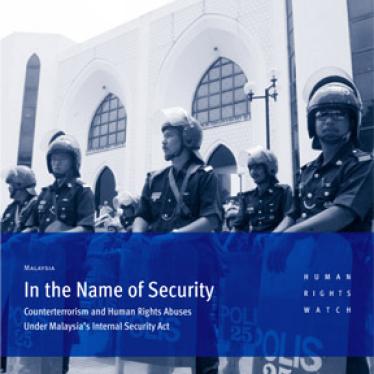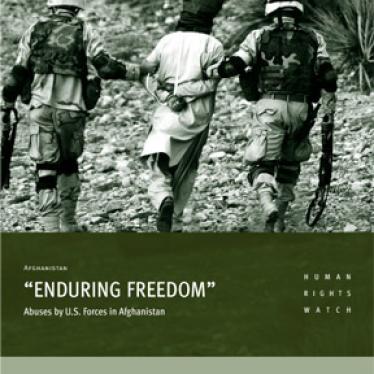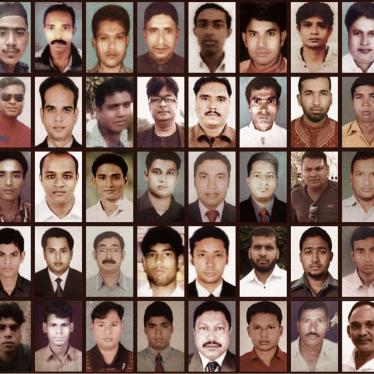(New York) - The Malaysian government is abusing detainees held without charge or trial under its draconian internal security law, Human Rights Watch said in a report released today. The Malaysian authorities should allow independent monitors access to the nearly 100 men held under its Internal Security Act—some for nearly three years—on accusations of connections to terrorist groups.
The 60-page report, “In the Name of Security: Counterterrorism and Human Rights Abuses Under Malaysia’s Internal Security Act,” documents a pattern of serious abuses against detainees, including beatings, burning with lit cigarettes, and psychological abuse.
Some detainees were subjected to sexually humiliating interrogations and were forced to stand semi-naked for long periods. One detainee was told to masturbate in front of prison officials, and another was forced to urinate while interrogators watched. Another was beaten in the genitals.
“U.S. abuse of detainees in Iraq, Afghanistan and Guantanamo shows what can happen behind closed doors,” said Sam Zarifi, deputy director for Asia at Human Rights Watch. “Malaysia needs to let independent observers into its detention centers to prevent further abuses against prisoners.”
In addition to suffering from various forms of physical and psychological abuse, detainees held under the Internal Security Act (ISA) have been denied basic due process rights. In the first several weeks after their arrest, detainees could not see a lawyer, and many were threatened with punishment for even trying to legally challenge their detention.
After holding some of the men for nearly three years, the government claims that it needs still more time for investigations. Human Rights Watch called on the Malaysian government to either charge or release all of the detainees.
The U.S. government has benefited from abusive practices by the Malaysian government and other governments in the region. The Human Rights Watch report sheds light on the case of the so-called “Karachi 13.” In October, 2003, U.S. counterterrorism officials extensively interrogated Malaysian and Indonesian students arbitrarily detained in Karachi, Pakistan. Thirteen Malaysian students, some of whom were under 18, were detained in Karachi without charge for nearly two months and mistreated by Pakistani authorities while in detention before being returned to Kuala Lumpur. Five remain in detention in Malaysia under the Internal Security Act.
Human Rights Watch also detailed how the U.S. practices at Guantanamo have influenced the treatment of ISA detainees in Malaysia. Malaysian officials regularly claimed that the abuses at Guantanamo give them license to engage in similar practices. At the same time, Malaysian interrogators have used Guantanamo as a threat: detainees who refused to “cooperate” with Malaysian security officials were told they could be transferred to U.S. custody at Guantanamo.
“The Malaysian government uses Guantanamo as a sword and a shield,” Zarifi said. “Abuses by U.S. authorities in the ‘war on terror’ give cover to governments that abuse their own citizens.”
The Bush administration’s current support for Malaysia’s use of the Internal Security Act to detain terrorist suspects without charge or trial marks a dramatic turnaround in U.S. policy. Previously, the United States was extremely critical of ISA detentions. Since the September 11 attacks on the United States, senior U.S. officials have praised the detentions and have referred to Malaysia as a “beacon of stability.”
Human Rights Watch called on the U.S. government to resume its former critical stance on the Internal Security Act. European Union governments, the Japanese government, and Malaysia’s neighbors in the Association of Southeast Asian Nations (ASEAN) should be critical of the Malaysian government’s continued use of the security act.
Malaysian Prime Minister Abdullah Badawi condemned the United States for the abuses at Abu Ghraib prison in Iraq, saying, “There is no excuse for what happened. We cannot accept it, and there is no justification at all for such inhumane treatment of the Iraqi prisoners.”
Prime Minister Abdullah should abolish the Internal Security Act, or substantially amend it to make it consistent with international human rights norms, Human Rights Watch said. The Malaysian government should also begin a full investigation into credible reports of abuses against ISA detainees.
“Prime Minister Abdullah has pledged to make changes in Malaysia,” said Zarifi. “He should start with getting rid of the ISA. These men deserve their day in court.”
Human Rights Watch recognizes the obligations of the Malaysian government to protect its population from terrorist attacks and to bring to justice those responsible for engaging in such attacks. But the Malaysian government has not yet shown that any of the individuals it has detained have engaged in any illegal activity. The Malaysian government should handle the investigation, arrest and detention of alleged militants through criminal procedures that include proper safeguards to protect the rights of the accused.
Background
Passed in 1960 in response to a Communist insurgency, the Internal Security Act has for decades been used against political opponents of Malaysia’s longtime ruling party, the United Malays National Organization (UMNO). The ISA has proven to be an effective tool for political repression in Malaysia because it allows for virtually indefinite detention with no chance for meaningful judicial review. Anwar Ibrahim, a former deputy prime minister, was initially detained under the ISA in 1998. In April 2001, 10 prominent Malaysian opposition activists were detained under the ISA, and six were detained for more than two years for organizing peaceful protests against the government.
The Internal Security Act took on new life as an antiterror measure in August 2001, when the government detained 10 men under the security law. Over the past three years, the Malaysian government has detained over 100 people suspected of involvement in terrorist activity, only a handful of whom have been released. Most of the detainees are accused of being members of the militant group Jemaah Islamiyah, which is allegedly responsible for killing more than 200 civilians in bombing attacks in Bali in 2002 and Jakarta in 2003.








